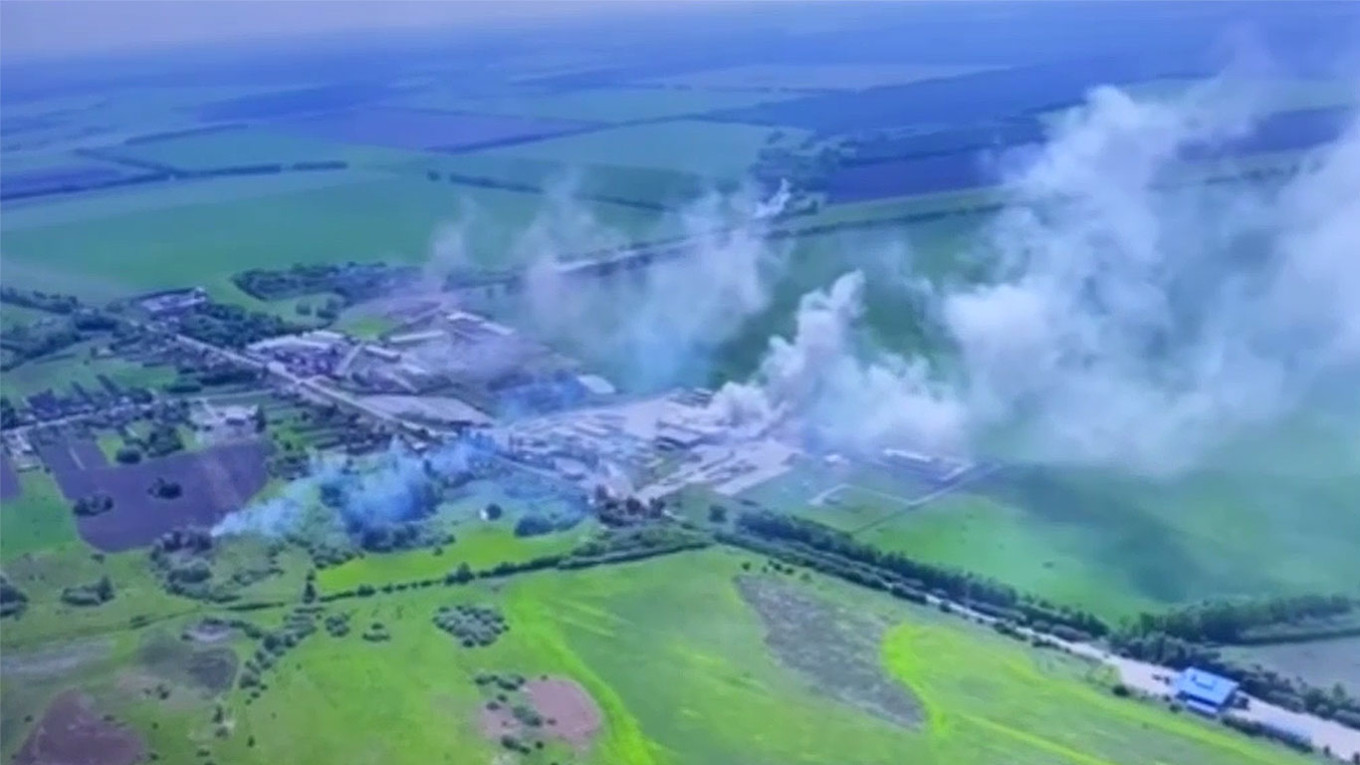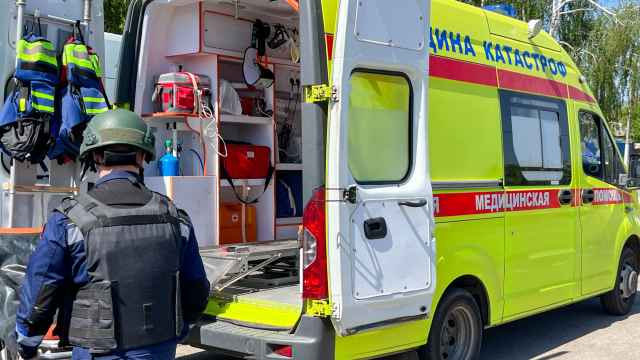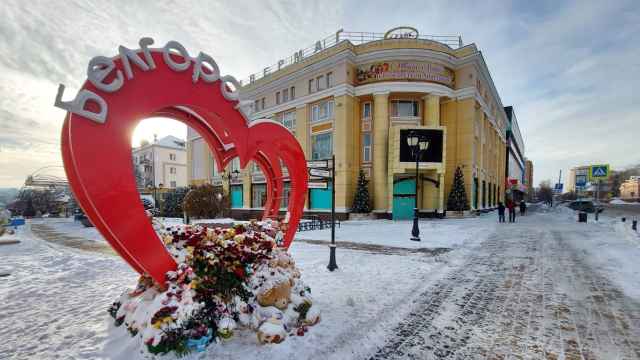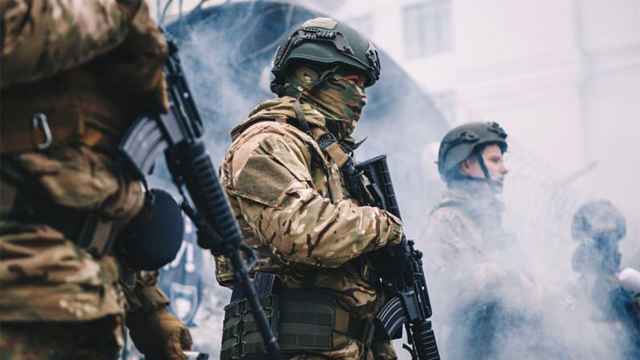The head of Russia’s Belgorod region which borders Ukraine, claimed Monday that a Ukrainian "sabotage group" had infiltrated the region, while anti-Kremlin Russians fighting alongside Ukraine's forces appeared to take responsibility.
“A VSU [armed forces of Ukraine] sabotage group entered the territory of Grayvoron district,” Belgorod Governor Vyacheslav Gladkov wrote on Telegram, referring to a district that lies on Ukraine's border. “The Russian Armed Forces together with border officials, the National Guard and the FSB are taking all the necessary measures to neutralize the enemy.”
The Kremlin said that Russian President Vladimir Putin had been informed of the alleged cross-border incursion.
"The Defense Ministry, the FSB [security service] and the border service reported to the Russian president... about an attempt of a Ukrainian sabotage group to break into the Belgorod region," Kremlin spokesman Dmitry Peskov told Russian news agencies.
Peskov said the incursion was designed to "divert attention" from Bakhmut and "minimize" Ukraine's loss of the eastern city, which Moscow claimed to capture.
Local authorities have introduced a “counterterrorism regime” throughout the entire region.
The regime empowers local authorities to conduct random identity checks and halt the work of factories and other facilities working with hazardous materials, according to Gladkov.
“The situation here is extremely tense,” Gladkov said during a livestream on his Telegram channel Monday evening.
Gladkov confirmed that most residents have left the Grayvoron district using personal vehicles or transportation provided by the authorities and the total number of wounded civilians had reached eight people.
“I hope our military will finish the operation shortly and the territory of Belgorod region will be freed from the enemy,” he said.
Ukraine denied being involved in an incursion into Russian territory.
"Ukraine is watching the events in the Belgorod region of Russia with interest and is studying the situation, but has nothing to do with it," Ukrainian presidential adviser Mikhaylo Podolyak said.
Earlier Monday, the Russian Volunteer Corps (RDK), a military unit made up of Russian volunteers fighting for Ukraine, published a series of videos on its Telegram channel showing the unit’s fighters next to road signs of villages in Russia’s Ukraine-neighboring Kursk, Bryansk and Belgorod regions.
“Well, RDK is back in the motherland. We are home, the time to fight for freedom of Russia has come,” an alleged fighter of the volunteer unit can be heard saying in one of the videos.
The Freedom of Russia Legion, a legion within the Ukrainian armed forces that also is also composed of Russian volunteers, published a video addressing Russian residents early on Monday.
“Be brave and don’t be afraid because we are coming home,” a member of the legion said in a video.
A subsequent post by the pro-Ukrainian Russian military unit addressed residents of border regions of Russia asking them to “remain at home and not resist” the soldiers of the unit.
Hours later, the Freedom of Russia Legion claimed to have “fully liberated” Kozinka, a rural settlement in the Belgorod region.
The Ukrainian defense ministry’s defense intelligence directorate also confirmed that the two units of Russian fighters were conducting an operation in Russia’s border regions, according to the independent Ukrainian news outlet Hromadske.
“Citizens of the Russian Federation, namely the fighters of RDK and the Freedom of Russia Legion, have taken on the responsibility for these events,” Ukrainian defense ministry representative Andrii Yusov told Hromadske.
The Russian units, according to Yusov, were working to create a demilitarized buffer zone between Russia and Ukraine.
“I think that all of us can only welcome the decisive actions of the opposition-minded citizens of the Russian Federation, who are ready for an armed struggle against Putin's criminal regime," Hromadske quoted Yusov as saying.
It was not possible to independently verify the claims from either side.
Gladkov’s statement comes after a video showing an allegedly Ukrainian armored vehicle attacking a border checkpoint in the region began widely circulating on social media.
Separately, according to the Baza Telegram channel, Russian authorities are working to verify the information about a crash of an Mi-8 helicopter in the Belgorod region. The sight of the crash is believed to be located some 100 kilometers from the border with Ukraine.
Areas of the Belgorod region have faced continuous heavy shelling since the early morning, according to officials.
At least two people have been injured as a result of the attack, one of whom was admitted to an intensive care unit at a local hospital in critical condition, according to Gladkov.
After Russian President Vladimir Putin sent troops to Ukraine in February 2022, the border region of Belgorod in the country's south has been repeatedly shelled, and dozens of people have been killed.
Authorities have also reported a series of incidents involving members of "sabotage" groups crossing over from Ukraine.
In April, the city of Belgorod was bombed by a Russian fighter jet that dropped ammunition over the city by accident.
AFP contributed reporting.
A Message from The Moscow Times:
Dear readers,
We are facing unprecedented challenges. Russia's Prosecutor General's Office has designated The Moscow Times as an "undesirable" organization, criminalizing our work and putting our staff at risk of prosecution. This follows our earlier unjust labeling as a "foreign agent."
These actions are direct attempts to silence independent journalism in Russia. The authorities claim our work "discredits the decisions of the Russian leadership." We see things differently: we strive to provide accurate, unbiased reporting on Russia.
We, the journalists of The Moscow Times, refuse to be silenced. But to continue our work, we need your help.
Your support, no matter how small, makes a world of difference. If you can, please support us monthly starting from just $2. It's quick to set up, and every contribution makes a significant impact.
By supporting The Moscow Times, you're defending open, independent journalism in the face of repression. Thank you for standing with us.
Remind me later.







